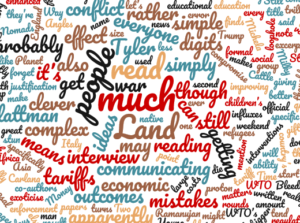Hi all,
These links start with deaths a disturbing amount these days. I must be getting old. I had thought Simspons characters don’t die, but apparently it’s quite common. Still, Stephen Hawking probably had a bigger impact on the world than Bleeding Gums Murphy, befitting a man who apparently said ‘my goal is simple: a complete understanding of the universe, what it is and why it is at all’. Imagine being a supervisor reading that in a research proposal. I’m not going to pretend to have read A Brief History of Time, though like everyone else I’ve written the odd note ripping off its iconic title. You can get flavour of his gift for communicating complex ideas simply in this excerpt, though.
- Speaking of communicating complex ideas simply, there are some gems in this Tyler Cowen interview with Chris Blattman. I particularly liked this: “I usually think of the incentives as aligned for peace, so war is the puzzle to be explained”, but he also picks out the aspects of conflict that economists tend to understate. In particular, he mentions our failure to really get to grips with the psychic costs and impacts of war and how much about conflict comes from people making mistakes (more generally, despite the influence of behavioural economists, mistakes and their implications for organisational forms, regulations and individual economic interactions are still under-studied). The interview goes through lulls when Tyler shoehorns in all sorts of tangential detritus (designed to showcase how clever he is, rather than how clever his interviewee is?), but it’s worth reading. Related: Blattman savages community-driven development in this twitter thread.
- What’s 22 trillion digits long and still getting longer? Fascinating piece about pi by Oliver Roeder, not least this: “A value of π to 40 digits would be more than enough to compute the circumference of the Milky Way galaxy to an error less than the size of a proton”. It also makes mention of Ramanujan, one of the most amazing people I have ever read about.
- Two papers on migrants and education. The first, by Michela Carlana and co-authors, finds that simple aspiration-raising interventions can have a substantial effect on performance; the second that large influxes of refugees does not compromise native children’s educational outcomes, rather improving them.
- Planet Money make a point that was missing in most of the hand-wringing I read about Trump tariffs, specifically that the formal justification used for the tariff is ‘US national security’. This takes advantage of a WTO loophole for the establishment of tariffs, and may result in very specific form of tit-for-tat that could fundamentally undermine the WTO’s institutional effectiveness (transcript).
- In news that will not exactly stun people who have transacted official business in much of South Asia, it turns out who you are matters for your outcomes. But interestingly, the mechanism may not be discrimination so much as an enhanced ability to pick ‘better’ economic partners when they’re from your own group – which might be an information or an enforcement effect, I would imagine.
- This map of Africa made the social media rounds this week, giving the etymology of every country’s name. But before we exoticise the ‘Land of the Milking Nomads’ too much, let’s not forget that England means ‘Land of the Angles’ and Italy probably means ‘Land of the Young Cattle’.
Have a great weekend, everyone!
R

